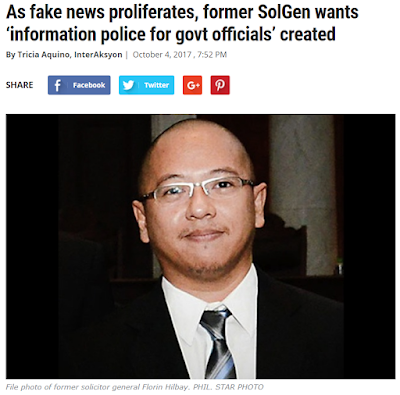Fake News, Critical Thinking, and Democracy
"They were not all fake news. Within the pile were true stories of Pepto Bismol-colored water pouring from faucets, a tornado spiraling alongside a rainbow and the president of the Philippines urging citizens to kill drug dealers." These are lines from an article describing a class on "Fighting Fake News" at the Newseum where students from Annandale High School are given the opportunity to figure which articles are real. The exercise has confirmed one concern shared by educators in the United States. Due to "fake news" being on the spotlight for a significant amount of time, some adolescents in the United States now think that everything they read is fake.
Proliferation of fake news is merely a symptom. Focusing on who writes or disseminates completely ignores the other question of why fake news has taken a strong grip on Philippine society. Entropy which measures probabilities can easily explain why fake news always has an upper hand. There is only one truth but there can be numerous lies. Even an incomplete set of facts can be misleading. For instance, the Department of Education in the Philippines has always made the claim that it has been providing for the needs of public schools. Whether this is true or not actualy depends on which school a child attends. A paper published in Regional Studies, Regional Science shows a great disparity in Philippine public school facilities:
Truth does depend on where you are. Schools in the capital region definitely do not have enough toilets and classrooms while those in Batangas are apparently in a much better situation. One can therefore report the case in Batangas with the specific agenda of illustrating that the government has answered the needs of basic education or report the case in Metro Manila where the opposite is true. Both are "fake news". Both misinform the public. And the above is not even politically charged or intrinsically divisive.
But seriously, a truth commission can never address the fact that people want to read what they believe in. A truth commission can never replace the fact that we, readers, should not be lazy in the first place. Critical thinking is hard work. It requires both time and effort. And so does democracy.
In the Philippines, the Senate has decided to tackle "fake news" as well. Senators have met with bloggers supposedly in order to get a better idea of this new medium through which information is now transmitted. A former solicitor general, Florin Hilbay, has even gone as far as suggesting the establishment of an "information police".
 |
| Above copied from Interaksyon |
Proliferation of fake news is merely a symptom. Focusing on who writes or disseminates completely ignores the other question of why fake news has taken a strong grip on Philippine society. Entropy which measures probabilities can easily explain why fake news always has an upper hand. There is only one truth but there can be numerous lies. Even an incomplete set of facts can be misleading. For instance, the Department of Education in the Philippines has always made the claim that it has been providing for the needs of public schools. Whether this is true or not actualy depends on which school a child attends. A paper published in Regional Studies, Regional Science shows a great disparity in Philippine public school facilities:
 |
| Above copied from Ligaya Leah Figueroa, Samsung Lim & Jihyun Lee Regional Studies, Regional Science Vol. 3 , Iss. 1, 2016 |
Truth does depend on where you are. Schools in the capital region definitely do not have enough toilets and classrooms while those in Batangas are apparently in a much better situation. One can therefore report the case in Batangas with the specific agenda of illustrating that the government has answered the needs of basic education or report the case in Metro Manila where the opposite is true. Both are "fake news". Both misinform the public. And the above is not even politically charged or intrinsically divisive.
But seriously, a truth commission can never address the fact that people want to read what they believe in. A truth commission can never replace the fact that we, readers, should not be lazy in the first place. Critical thinking is hard work. It requires both time and effort. And so does democracy.
Comments
Post a Comment